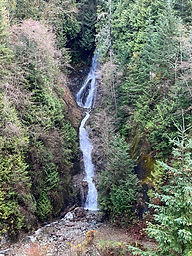Praise Pours in for Pilot Project Grant
- kc dyer
- Apr 1
- 3 min read
Committee members see metering as good management tool

Last week's decision to accept a provincial grant of close to $4 million to take part in a water metering pilot project has received the thumbs up from members of the Climate Action and Infrastructure committees.
Norm Barmeier, former councillor and a member of the Village Climate Action committee, spoke in support of the project at the special meeting held Monday, March 24.
After the meeting, Barmeier expanded on his thoughts. Referencing the provincial standards for drinking water, he explained how water metering allows for both good asset and resource management.
"It's good asset management in that water metering aids in finding and fixing leaks and keeping our system in a good state of repair. It's a tool to locate leaks in real time."
Fixing leaks also aids in conservation, he said, hence the good resource management. "Also, individuals can see and compare their usage to established norms around per capita water use."
Barmeier noted that since the province identifies conservation as a primary objective, water metering will allow our community to be more competitive for future grants.
He said that asset management is "not as sexy" as the conservation and climate action rationale for accepting metering, but is equally important.
Infrastructure Committee members Brian Ulrich and Anthony Greville also expressed support for the pilot project. Ulrich expressed some hesitation over the sharing of information with the provincial government, but said that the overall value of the project to residents outweighs those concerns.
Greville said that his long-standing concerns over the cost of water metering have been put to rest in this case, as all costs of installation and management for residents will be covered by the grant. He also raised the concern that the Village faces with raw water storage, since we have no reservoir.
"We had a drought situation in 2015, and Villagers responded well. However, over the years, attention to water usage slipped and after four or five years, consumption was back to an unacceptable level. In 2024 we faced another drought year - and 2025 is shaping up to be worse."
Greville noted that while fortuitous rain helped last year, we can't count on it for the future. He said that the combination of bringing Alberta Creek on line to increase supply volumes and identifying and fixing leaks in the Village's water distribution system also helped.
"But this is not a 'single fix and we are done' scenario," he said, citing data showing the average lifespan of waterlines in North American systems is 53 years. Lions Bay was incorporated in 1971, meaning our systems are now older than that.
"Distribution system leaks in Lions Bay are a fact of life, and will be for a long time to come," Greville said, noting that this takes on new importance when raw water supply volumes for Lions Bay are shown to be diminishing each year.

Greville provided the figures noted in the infographic above, and referenced staff comments from the water meter proposal: “Leak fixing since May 2023 has resulted in a 50% reduction in water consumption. Today’s wintertime rates are around 1,510,000 litres per day. At approx. 1,550 users, Lions Bay water demand is thus 1,000 litres per person per day, still three times the regional average.”
Greville added while this figure is already very high, summer consumption is traditionally much higher, sometimes reaching 1,600 litres per day, which nears the maximum of our traditional creek supply.
"This means Lions Bay’s winter water consumption rate, even when there is no outdoor irrigation or swimming pools (usage) is double the Metro Vancouver annual average, almost double the Canadian annual average, and is three times the European annual average consumption rate."
All members of both committees who spoke to The Watershed agree that for most of the year, water conservation is not an issue. However with dwindling supplies over the summer, for the raw water sources to meet Village needs, we need to reduce demand.
"We need to get our water demand down a further 25% decrease in consumption, on top of the 50% reduction already managed," says Greville. "Water metering is undoubtedly a very important tool in making this happen."
The Watershed values your opinion.
Share your thoughts below, or email editor@lionsbaywatershed.ca
Like what you're reading?
For as little as $5/month, you can support local independent journalism
by subscribing to The Watershed HERE.


Comments